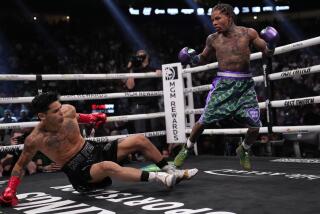Tarver Shakes off Burgers, Then Critics
- Share via
ATLANTA — Antonio Tarver, who fought like Ronald McDonald four days ago, dumped the all-you-can-eat, double-cheeseburger diet and made a startling discovery:
You won’t get booed when you actually look as if you’re trying.
The American light-heavyweight gold-medal favorite, razzed by the home-country crowd in his last, turgid victory, rehabilitated his reputation Sunday with a crackling first-round stoppage of David Kowah of Sierra Leone before a roaring sellout crowd at Alexander Memorial Coliseum.
The point? McDonald’s is an omnipresent official sponsor of the Games, but no longer on Tarver’s menu.
“You can blame me for not being ready for that first fight--actually, maybe you can blame McDonald’s,” Tarver said, smiling. “I had to lose seven pounds the night before because I took an extra trip to McDonald’s--we get excited, it’s free, all those double-cheeseburgers. But I’ve stopped that now.”
Go for the golden arches?
On Wednesday, the left-handed Tarver, seen as the American standard bearer, trudged to a lackluster 5-2 victory over Russian Dmitri Vrbornov.
Sunday, after Kowah had done his best grunting, posturing WWF imitation during the introductions, Tarver staved off the boos by landing a scalding left in the first 20 seconds, clearly dazing Kowah.
A minute and a half later, Tarver nailed Kowah with a right-left power combination that brought a standing-eight count, and followed that with a flurry, running the score to 9-0 and prompting the referee to stop the fight at 2:43 of the first round.
The U.S coaching staff felt strongly enough about Tarver needing to pick up his game that Saturday night, while trying to pump him up, assistant coach Jesse Ravelo pounded his fist through a wall in the Olympic Village.
“The boos, the coaches jumping on him, that helped him,” said assistant coach Pat Burns. “He kind of put his feet back on the ground and came alive. You saw the Tony Tarver of old--but he’s still not at his best.”
In the night session, squat, power-hitting light-welterweight David Diaz of Chicago got tangled up by savvy German Oktay Urkal and never got going. Urkal, a prototype of the tall, long-armed, quick-handed European amateur, jumped to a 5-0 lead and cruised to a 14-6 victory.
At a news conference afterward, Diaz, 20, cried for his mother, Vasilisa, who has had recent kidney troubles and could not come to Atlanta.
“I did my best,” he said. “The only thing I’m disappointed about is that I didn’t. . . . I did nothing for my mother. She’s the only person I’m worried about.”
In what has become a familiar theme, the U.S. coaches complained of biased scoring and poor refereeing--but should have blamed Diaz’s mauling style, which is not favored by amateur judges.
In all five of the American team’s losses, the American coaches have blamed the referee, the judges or both for the defeats. Sunday, the international boxing federation rejected the U.S. protest of super-heavyweight Lawrence Clay-Bey’s loss Saturday.
“[Urkal] got seven consecutive points right off the bat, and I don’t know where they came from,” said Ravelo, who also argued that Urkal had held the charging Diaz throughout the bout.
Heading into the quarterfinal round, which begins Tuesday, the U.S. has seven fighters remaining and a 15-5 record--the same totals as at this point of the disappointing 1992 Barcelona Games.
In Barcelona, the Americans fell apart in the quarterfinals, going 3-4, and ended up with only one gold, one silver and one bronze medal.
“I figured about 10 or 11 of our guys would make it to the quarterfinals, so I’m a little short,” U.S. Coach Al Mitchell said. “I feel good about our guys, but it’s not what I wanted.”
For the U.S., the key bout probably will occur Wednesday when featherweight Floyd Mayweather faces Cuban Lorenzo Aragon.
More to Read
Go beyond the scoreboard
Get the latest on L.A.'s teams in the daily Sports Report newsletter.
You may occasionally receive promotional content from the Los Angeles Times.










